Computer Science News
5+ papers accepted to STOC 2023
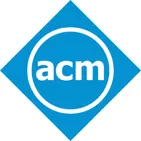
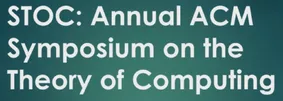

Several papers from the Theory and Foundations (FoCS) Research Group and the Centre for Discrete Mathematics and its Applications (DIMAP) have been accepted to the 55th ACM SIGACT Symposium on Theory of Computing (STOC 2023), the ACM flagship conference in theoretical computer science that will be held on June 20-23, 2023 in Orlando, Florida, USA:
- "Kneser graphs are Hamiltonian" by Arturo Merino, Torsten Mütze, and Namrata.
- "A duality between one-way functions and average-case symmetry of information" by Shuichi Hirahara, Rahul Ilango, Zhenjian Lu, Mikito Nanashima, and Igor C. Oliveira.
- "Unprovability of strong complexity lower bounds in bounded arithmetic" by Jiatu Li and Igor C. Oliveira.
- "Sublinear algorithms for (1.5+ϵ)-approximate matching" by Sayan Bhattacharya, Peter Kiss, and Thatchaphol Saranurak.
- "Towards the Erdős-Gallai cycle decomposition conjecture" by Matija Bucic and Richard Montgomery.
Further, there are two more accepted papers autored by Shuichi Hirahara, who was affiliated with the department and the FoCS group during the submission time, in Autumn 2022:
- "Capturing one-way functions via NP-hardness of meta-complexity" by Shuichi Hirahara.
- "Hardness self-amplification: Simplified, optimized, and unified" by Shuichi Hirahara and Nobutaka Shimizu.
Prof. Adi Shamir receives Honorary Doctorate from Warwick
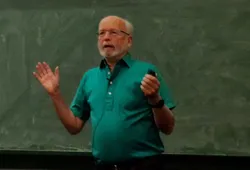 Prof. Adi Shamir (Weizmann Institute of Science), the world-renowned cryptographer and a recipient of the ACM Turing Award 2002 (the highest honour in computer science received jointly with Prof. Ronald Rivest and Prof. Leonard M. Adleman), visited our campus in January 2023 to collect an Honorary Doctorate from the University of Warwick. During his visit, Prof. Shamir gave also a research talk at the DIMAP seminar and CS Colloquium entitled "Efficient Detection of High Probability Cryptanalytic Properties of Boolean Functions."
Prof. Adi Shamir (Weizmann Institute of Science), the world-renowned cryptographer and a recipient of the ACM Turing Award 2002 (the highest honour in computer science received jointly with Prof. Ronald Rivest and Prof. Leonard M. Adleman), visited our campus in January 2023 to collect an Honorary Doctorate from the University of Warwick. During his visit, Prof. Shamir gave also a research talk at the DIMAP seminar and CS Colloquium entitled "Efficient Detection of High Probability Cryptanalytic Properties of Boolean Functions."
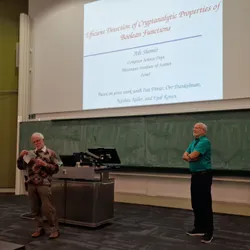 Prof. Shamir has been known in Warwick since 1976, when he spent a year as a post-doc with our own Prof. Mike Paterson. Directly after Warwick Prof. Shamir went to MIT, where together with Adleman and Rivest he invented the famous RSA public-key cryptography algorithm for encoding and decoding messages, used nowadays by millions to securely transmit messages over the internet. The work on RSA has been immensely influential and led to the 2002 A.M. Turing Award for the three co-inventors, cited for the “ingenious contribution for making public-key cryptography useful in practice.” Other noticeable awards (for RSA and other numerous contributions to cryptography and computing) received by Prof. Shamir include the 2000 Institute of Electrical and Electronics Engineers Koji Kobayashi Computers and Communications Award, the Israel Mathematical Union Erdős Prize in Mathematics (1983), the Vatican Pontifical Academy PIUS XI Gold Medal (1992), the Association for Computing Machinery Paris Kannellakis Theory and Practice Award (1996), the Israel Prize in Computer Science (2008), and the Japan Prize in the field of electronics, information, and technology (2017), and the Foreign Member of the Royal Society (2018).
Prof. Shamir has been known in Warwick since 1976, when he spent a year as a post-doc with our own Prof. Mike Paterson. Directly after Warwick Prof. Shamir went to MIT, where together with Adleman and Rivest he invented the famous RSA public-key cryptography algorithm for encoding and decoding messages, used nowadays by millions to securely transmit messages over the internet. The work on RSA has been immensely influential and led to the 2002 A.M. Turing Award for the three co-inventors, cited for the “ingenious contribution for making public-key cryptography useful in practice.” Other noticeable awards (for RSA and other numerous contributions to cryptography and computing) received by Prof. Shamir include the 2000 Institute of Electrical and Electronics Engineers Koji Kobayashi Computers and Communications Award, the Israel Mathematical Union Erdős Prize in Mathematics (1983), the Vatican Pontifical Academy PIUS XI Gold Medal (1992), the Association for Computing Machinery Paris Kannellakis Theory and Practice Award (1996), the Israel Prize in Computer Science (2008), and the Japan Prize in the field of electronics, information, and technology (2017), and the Foreign Member of the Royal Society (2018).
Complexity breakthrough by Dr Shuichi Hirahara
DIMAP Theory Day 2022
On December 12, 2022, we held the DIMAP Theory Day 2022. This event highlighted recent, exciting advances in the field of Algorithms and Complexity and provided means to facilitate interactions within the algorithms research community in the UK. The event was supported by the Centre for Discrete Mathematics and its Applications (DIMAP) and UKRI. We plan to hold further events in this series on a regular basis.
See more details at the DIMAP Theory Day 2022 page
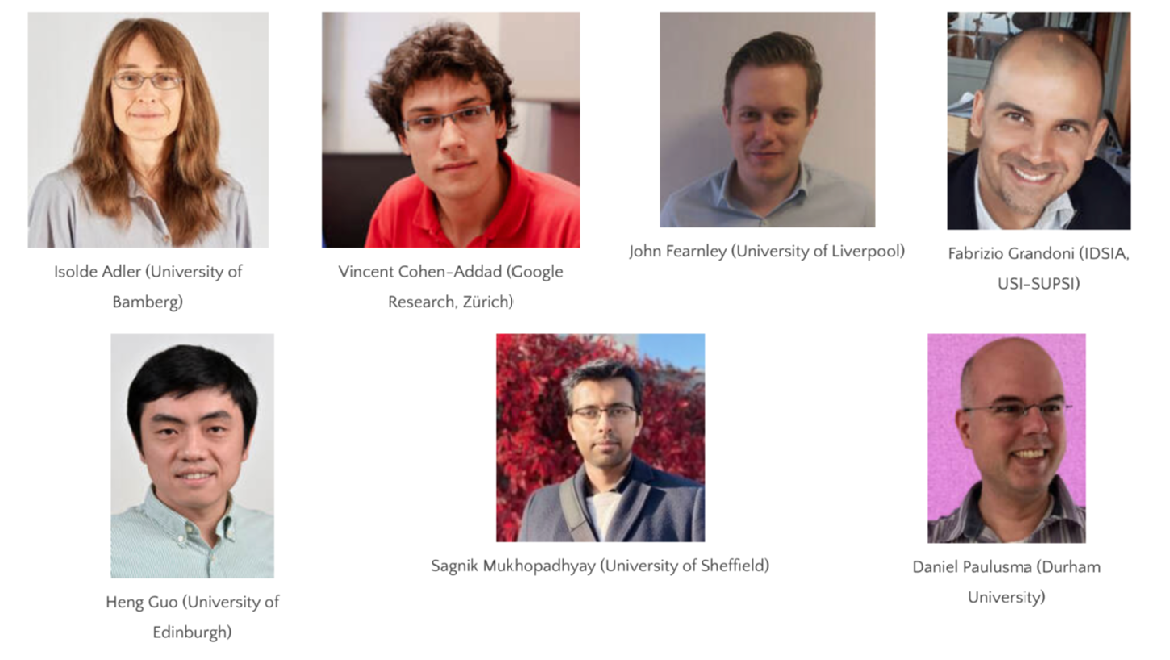
Workshop on Algebraic Complexity Theory (WACT)
The University of Warwick will be hosting the Seventh Workshop on Algebraic Complexity Theory (WACT) from March 27 to March 31, 2023.
https://www.dcs.warwick.ac.uk/~u2270030/wactLink opens in a new window
Algebraic Complexity Theory is a vibrant field that has been seeing a tremendous amount of activity in the recent years. Its classical questions have been interwoven with deep questions from algebraic geometry, invariant theory, and representation theory. Researchers study a wide range of interlinked topics: arithmetic circuit lower bounds, algorithmic algebra, algorithmic invariant theory, geometric complexity theory, tensor rank, polynomial identity testing, and polynomial reconstruction, to name a few. The workshop brings together experts from different parts of this rich field to discuss the current state of the art, discover new connections, and set the directions for the future.
Warwick Quantum papers accepted to the top quantum conference QIP
Two papers by members of Warwick Quantum were accepted to QIP 2023, the most prestigious conference in Quantum Computing and Quantum Information.
These works provide a methodology for boosting the power of quantum algorithms using deep mathematical tools from additive combinatorics, as well as provide the techniques, tools, and abstractions necessary to answer when classical zero-knowledge protocols remain secure against quantum attacks.
- "Quantum Worst-Case to Average-Case Reductions for All Linear Problems" by Vahid R. Asadi, Alexander Golovnev, Tom Gur, Igor Shinkar, and Sathyawageeswar Subramanian.
- "Post-Quantum Zero Knowledge, Revisited" by Alex Lombardi, Fermi Ma and Nicholas Spooner.
Dr Igor Oliveira awarded an ERC Starting Grant
The European Research Council (ERC) has announced that Dr Igor OliveiraLink opens in a new window is among the winners of its prestigious Starting Grant competition. According to the European Research Council: "The funding is worth in total €636 million and is part of the Horizon Europe programme. It will help excellent younger scientists, who have 2 to 7 years’ experience after their PhDs, to launch their own projects, form their teams and pursue their most promising ideas."
Igor OliveiraLink opens in a new window has been awarded a €1.5M ERC Starting grant for a 5-year project entitled "Synergies Between Complexity and Learning". The project aims to exchange ideas and techniques between Complexity Theory and Learning Theory to accelerate progress in both fields, broaden the arsenal of tools available to attack their open problems, as well as to obtain a deeper understanding of the nature of efficient computation and of its logical aspects.
Two projects in Computer Science and Informatics (PE6 panel) in the United Kingdom were awarded ERC Starting Grants in the 2022 round. The press releaseLink opens in a new window contains more information about the ERC funding programme.
